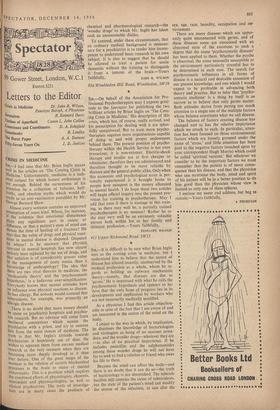S IR, —It is difficult to be sure what Brian Inglis sees
as the coming crisis in medicine, but I understand him to believe that the nature of disease has altered recently, unobserved by the medical profession as a whole, whom he re- gards as holding an outworn mechanistic theory—namely, that diseases are due to 'germs.' He is impressed with what he calls the psychosomatic hypothesis and appears to be- lieve that the only hope of progress lies in its development and application by workers who are not necessarily medically qualified.
As a physician I find this article objection- able in spite of the fact that I am aware of and am interested in the action of the mind on the body.
I object to the way in which, by implication, he dismisses the knowledge of bacteriologists and virologists as being of no account nowa- days, and the wonder drugs—whatever they are —as also of no practical importance. If he includes penicillin and the sulphonamides among these wonder drugs he will not have far to seek to find a relation or friend who owes his life to them.
Because the mind can affect the body—and there is no doubt that it can do so—the truth of bacteriology is not diminished. The tubercle bacillus still remains the cause of tuberculosis, but the state of the patient's mind can modify the oourse of the infection, as can also the sex, age, race, heredity, occupation and en- vironment.
There are many diseases which are appar- ently quite unconnected with germs, and of these diseases some are associated with an abnormal state of the emotions to such a degree that the name 'psychosomatic diseases' has been applied to them. Whether the psyche is abnormal, the soma unusually susceptible or the environment particularly stressful has to be determined in each case. The search for psychosomatic influences in all forms of disease is a natural and desirable extension of our present knowledge, and one which I would expect to be profitable in advancing both theory and practice. But to infer that 'psycho- somatic medicine' is a thing by itself is as narrow as to believe that only germs matter. Both attitudes derive from paying too much attention to a single one of the multiple factors whose balance constitutes what we call disease.
The balance of factors creating disease has changed and so has the relative importance which we attach to each. In particular, atten- tion has been focused on those environmental factors which are loosely grouped under the name of 'stress,' and little attention has been paid to the negative factors (touched upon by your correspondent Hugh Morris) which could be called 'spiritual vacuum.' But whatever we consider to be the important factors we must remember that the patient is of more conse- quence than his disease, and that the physician who can scrutinise the body, mind and spirit of his patient will be in a better position to do him good than the physician whose view is limited to only one of these spheres.
I enclose my name and address, but beg to remain.—Yours faithfully,










































 Previous page
Previous page